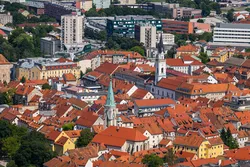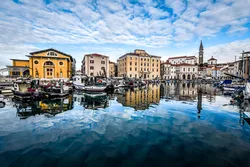See all articles relating to: Slovenia

Slovenia is a country located in central Europe, bordered by Italy to the west, Austria to the north, Hungary to the northeast, and Croatia to the south and southeast. Its history dates back to prehistoric times. Throughout its history, Slovenia has been inhabited by various tribes and peoples, including the Celts, Romans, and Slavs. It came under Habsberg rule in the 14th century and remained part of the Austro-Hungarian Empire until World War I. After the war, Slovenia joined the Kingdom of Yugoslavia and later declared independence in 1991, following a brief period of conflict with the Yugoslav army. Today, Slovenia is a parliamentary republic and a member of the European Union, NATO, and the United Nations. Its rich history is reflected in its culture, architecture, and customs, making it a fascinating destination for travelers interested in history and culture.
Research your ancestors on MyHeritage
The regions of SloveniaThe regions of Slovenia
Slovenia is divided into statistical regions:
- Pomurska (Mura)
- Podravska (Drava)
- Koroška (Carinthia)
- Savinjska (Savinja)
- Posavska (Lower Sava)
- Zasavska (Central Sava)
- Jugovzhodna Slovenija (Southeast Slovenia)
- Osrednjeslovenska (Central Slovenia)
- Gorenjska (Upper Carniola)
- Primorsko-notranjska (Littoral–Inner Carniola)
- Goriška (Gorizia)
- Obalno-kraška (Coastal–Karst)
Slovenian historySlovenian history
See:
Slovenian geographySlovenian geography
See:
Researching family history in SloveniaResearching family history in Slovenia
See also:
- Slovenian genealogy
- Slovenian immigration
- Slovenian emigration
- Slovenian archives
- Slovenian genealogy
- Slovenian American genealogy
- Vital records in Slovenia
- Birth records in Slovenia
- Death records in Slovenia
- Marriage records in Slovenia
- Census records in Slovenia
- Civil registrations in Slovenia
- Church records in Slovenia
- Newspaper records in Slovenia
- Military records in Slovenia
Slovenian ethnicitySlovenian ethnicity

Slovenia is a relatively homogenous country with a population of around 2 million people. The majority of the population identifies as Slovene. Other minority groups in Slovenia include Croats, Serbs, Bosniaks, and Roma. There are also small communities of Italians, Hungarians, and Austrians living in Slovenia, primarily in border areas. The diversity of ethnicities in Slovenia is reflected in the country's culture, traditions, and cuisine, with each group contributing to the country's unique identity.
See also:
Slovenian surnamesSlovenian surnames
Slovenian surnames can provide valuable clues for researching family history, as they are often passed down through generations and can reveal important information about family origins and relationships. Most Slovenian surnames are derived from occupations, geographical locations, or personal characteristics, and can help in tracing the movements of families over time. For example, the surname "Novak" means "newcomer," and the surname "Kovac" means "blacksmith". Many surnames also have regional variations or alternate spellings, which can add further complexity to the research process.
Examples of different Slovenian surnames:
See also:

